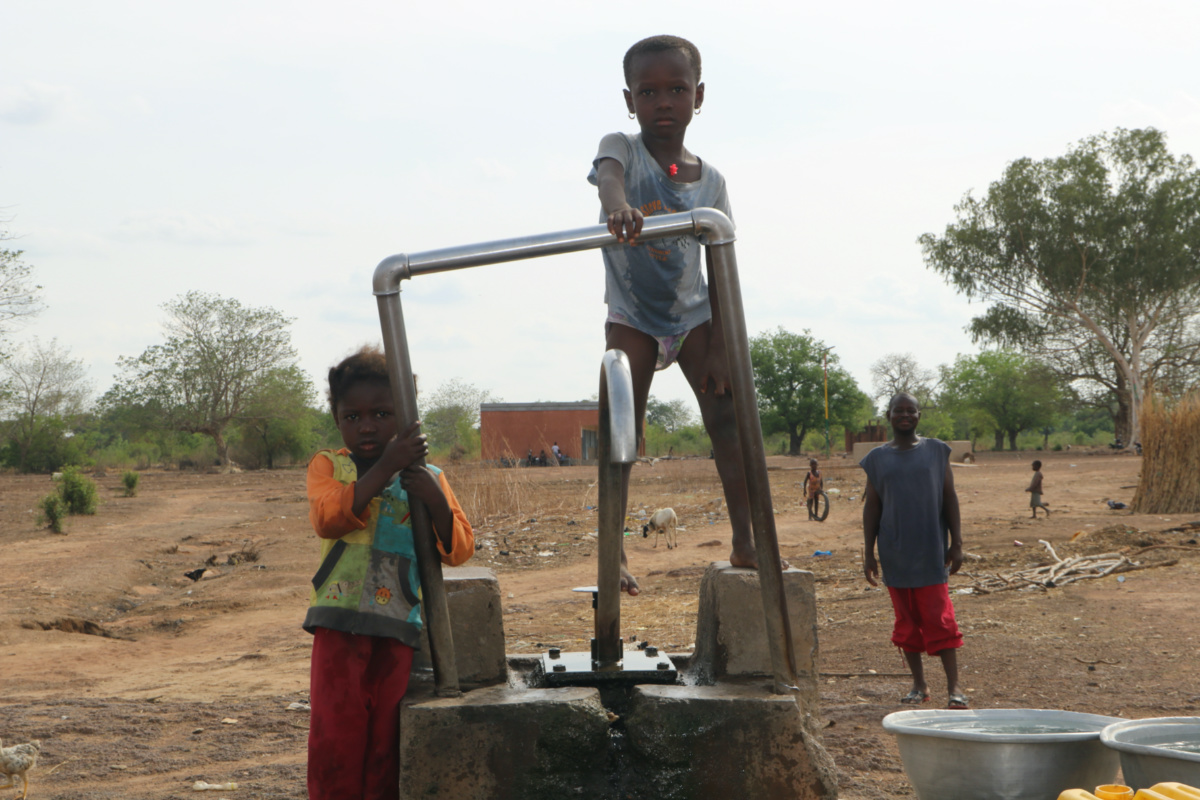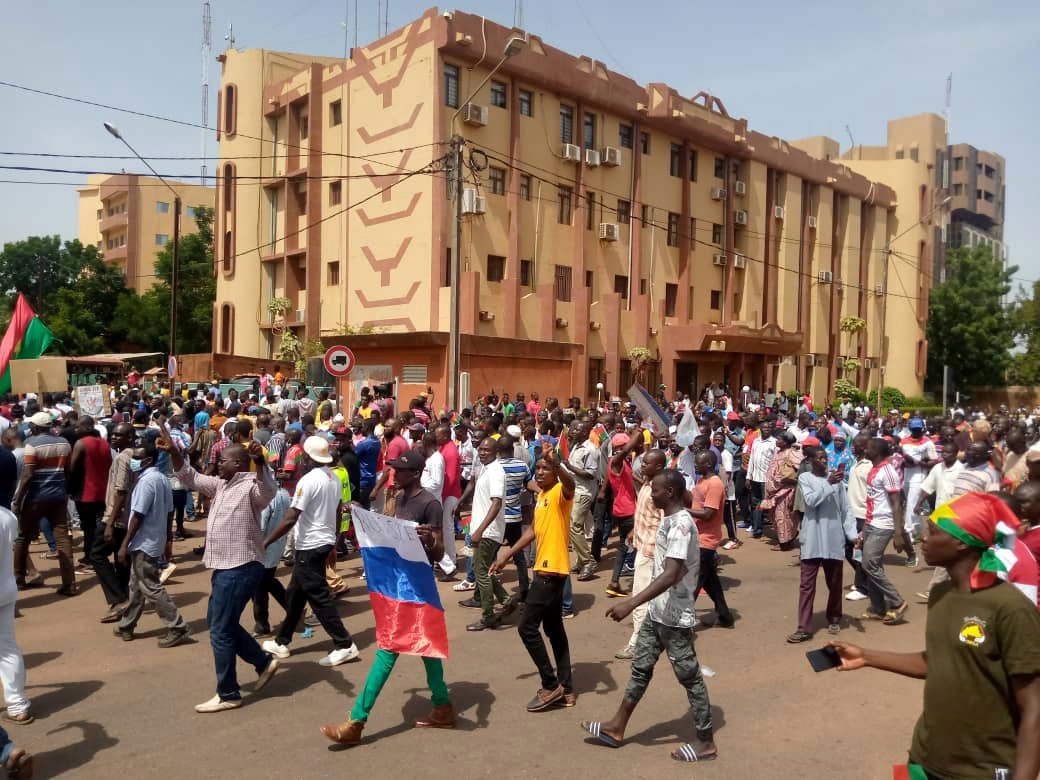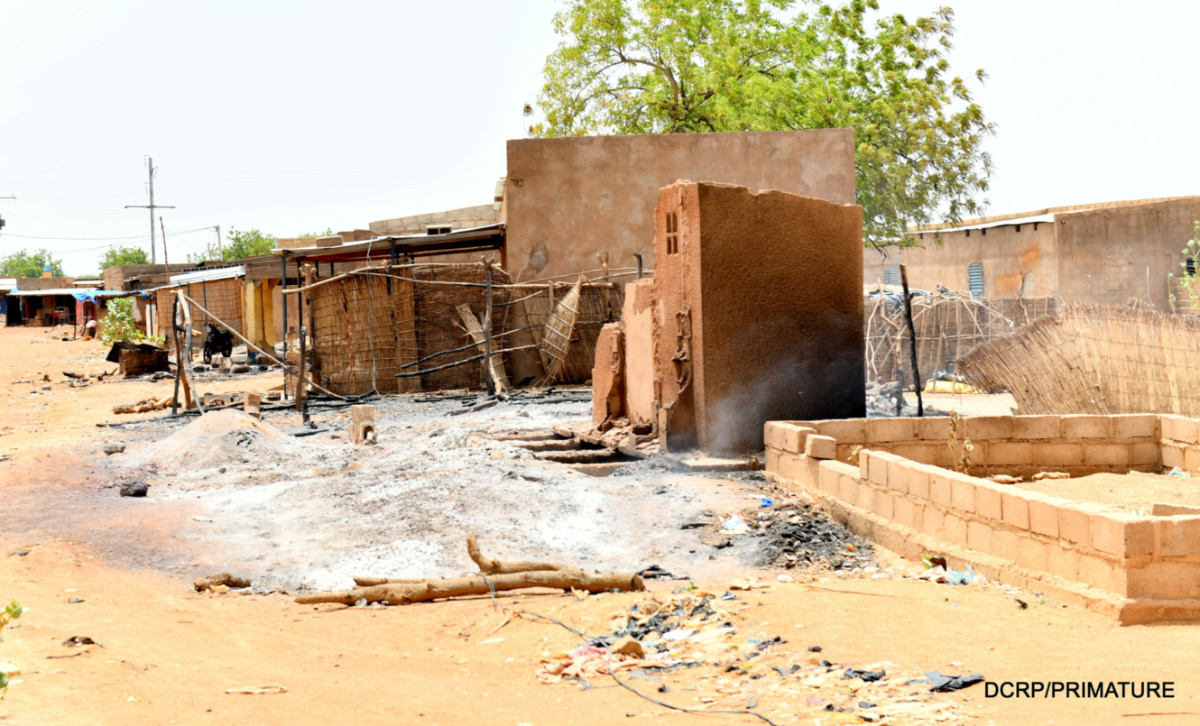
SAM MEDNICK, of Associated Press, reports on the expanding conflict in the West African nation…
Banfora, Burkina Faso
AP
Florent Coulibaly, a soldier in Burkina Faso’s army, says he hasn’t been sleeping well for the past few months as he is often roused at 3am to fight jihadi rebels.
Until recently life was peaceful in western Burkina Faso’s Comoe province, but an increase in attacks by extremist groups in the country’s west has put the military on edge.
“It tires us. It gives us a lot of work. It scares us, too,” said Coulibaly, 27. “We don’t know where [the jihadis] are going to come from. They see us, but we don’t see them. They know us, but we don’t know them.”

Children play on a water pump in an internally displaced camp in Gaoa, Burkina Faso, on 22nd April. Until recently life was peaceful in western Burkina Faso’s Comoe province, but an increase in attacks by extremist groups in the country’s west has put the military on edge. Burkina Faso is experiencing an increase in extremist violence by groups linked to al-Qaeda and the Islamic State. PICTURE: AP Photo/Sam Mednick.
Over the past six months, his battalion has doubled its patrols from once a week to twice, but Coulibaly says the men are ill-equipped, overworked and worry the area could be overrun by jihadis.
Burkina Faso is experiencing an increase in extremist violence by groups linked to al-Qaeda and the Islamic State group. Last month, at least 11 police officers were killed when their patrol was ambushed in the north. The country also experienced its deadliest violence in years when at least 132 civilians were killed in an attack in its Sahel region.
Burkina Faso is experiencing an increase in extremist violence by groups linked to al-Qaeda and the Islamic State group. Last month, at least 11 police officers were killed when their patrol was ambushed in the north. The country also experienced its deadliest violence in years when at least 132 civilians were killed in an attack in its Sahel region.
The jihadi rebels are also expanding their reach within Burkina Faso. Extremist violence centred in the country’s north and east has spread into the west and south-west areas near Mali and Ivory Coast, bringing residents and security forces in those areas to brace for more conflict.
The move into western Burkina Faso makes strategic sense for the groups who can use it as a base to extend their operations in West Africa. The thick vegetation gives them cover and the area can give them territorial control over the smuggling route between Gulf of Guinea countries and Mali.
Attacks in three regions of Burkina Faso’s south and south-west quadrupled from four to 17 between 2018 and 2019, according to the Armed Conflict Location and Event Data Project. There were nine attacks last year – a reduction that analysts attribute to increased military operations as well as the expansion of violence across the border in neighboring Ivory Coast.
In June, a soldier was killed in north-eastern Ivory Coast on the border with Burkina Faso, and in March there was an attack by 60 gunmen on two security outposts in Ivory Coast, killing three people.
“This attack confirmed the intention of armed groups to target the north of coastal countries. This is likely a new phase in the groups’ strategy to expand into these areas,” said Florent Geel, deputy director-general for Promediation, an international organisation focused on mediation.

Opposition parties supporters attend a protest to denounce the government’s handling of the security situation following attacks by Islamist militants that have killed scores in the past weeks In Ouagadougou, Burkina Faso, on 3rd July. PICTURE: Reuters/Ndiaga Thiam/File photo.
During a trip in April to the towns of Banfora and Gaoua in the west and southwest, as well as one village near the border with Ivory Coast, local defence groups and security forces told The Associated Press they didn’t have the manpower to stem the violence and felt like it was just a matter of time until the area was inundated by jihadis. Civilians also say they’ve started living in fear.
Last year, for the first time, jihadis posted notes on classroom doors warning students and teachers to stay away, said a 35-year-old primary teacher in a village in Comoe province who didn’t want to be named for fear of his safety. While his village hasn’t been attacked, it has become militarised with checkpoints stoking paranoia among residents.
“The situation is deteriorating…In the past you could leave [the village] at midnight with your motorbike…But today you are not going to take the risk…When you’re sleeping you’re on the lookout, when you hear a strange noise you startle, but before it wasn’t like that,” he said.
Large numbers of teachers, including himself, are asking to transfer from less secure villages, which are easier for jihadis to attack, into larger towns like Banfora, he said.
Burkina Faso’s army is also trying to work with the Ivorian military by conducting joint patrols and sharing intelligence, but during at least one clash with jihadis, the Ivorian soldiers refused to fight, the military said.
Some areas have no security presence and rely on local defence groups to stave off extremists. In Gaoua, a group of Dozos – traditional hunters who operate across the region – said they’re often the first to arrive when there is an attack, with the army showing up three hours later or not at all.
“It’s discouraging,” said Noufe Sansan, a Dozo chief. Pointing to a text message on his phone that he received from a security officer informing him that there are more than 60 extremists hiding in a nearby forest, he said news of attacks in the once peaceful area have become almost daily.
The Dozos are trying to strengthen their forces and alert the community of the potential for future violence, but want help from the government. Two years ago, they asked for 24 motorbikes to increase mobility to better respond to attacks, but have yet to receive anything, he said.

A view shows damaged buildings and huts at the site of an attack in the village of Solhan, in Yagha province bordering Niger, Burkina Faso, on 7th Junw. PICTURE: Burkina Faso Prime Minister’s Press Service/Handout via Reuters.
Meanwhile, civilians who escaped the volatility in the north in hopes of rebuilding their lives in more peaceful parts of the country, say they’re fed up from fleeing.
Seated on the ground in Niangoloko village, 15 kilometres from Ivory Coast’s border, Saydou Gamsore described how he fled his home last year because of the extremist violence and said if he’s attacked again, he’d rather die than keep moving.
“We are tired of running away,” said the 76-year-old. “Even if it means death…I will stay here.”





